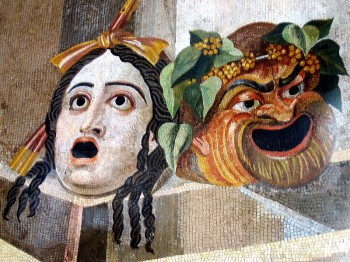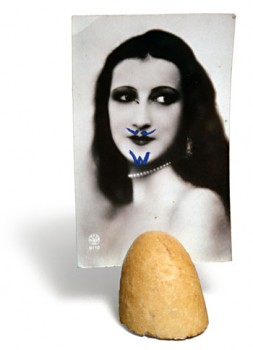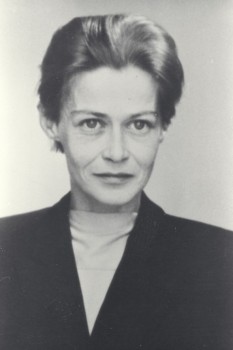Author: The Editors
Postcards from the lakeside
8 August 2010 | This 'n' that
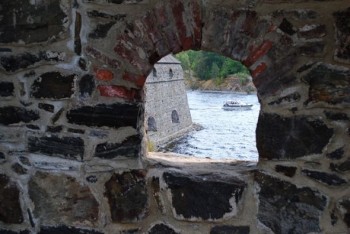
A tower with a view: Olavinlinna (St Olaf's castle). Photo: Lola Rogers
Translator Lola Rogers (of, for example, Sofi Oksanen’s best-selling novel Purge), from Seattle, spent a few weeks in Finland, and went on a cruise on Lake Saimaa.
Olavinlinna (St Olaf’s castle), and the opera, in the city of Savonlinna, was one of her stops; take a look at her blog – you’ll perhaps recognise the the inventive 16th-century wall privies on the towers we wrote about a while ago.
There are quite a few photos from Helsinki, too – from this hot, hot (too hot?) summer.
What the critic said
9 July 2010 | Letter from the Editors

Illustration by Joan Barrás
‘Pay no attention to what the critics say. A statue has never been erected in honour of a critic,’ said the Finnish composer Jean Sibelius.
No, probably not; but people still read what the critics write – and, sometimes, also what they wrote fifty or a hundred years ago.
An annual list of professions most highly valued by the public in Finland is always headed by surgeons. Shepherds generally feature at the bottom of the list. But critics fare none too well, either – a couple of years ago they were ranked between butchers and gravediggers. Which, of course, can be interpreted, in metaphorical terms, either as hilarious or tragicomical. More…
Face to face
24 June 2010 | This 'n' that
 You can now keep up with what’s new at Books from Finland on Facebook.
You can now keep up with what’s new at Books from Finland on Facebook.
And remember: you can also get Books from Finland articles delivered straight to your inbox or smartphone by signing up to our RSS feed, or subscribing to our regular newsletter – the new one is, as we used to say, currently in the typewriter and will be with you soon.
Let’s keep in touch!
Need to go?
23 June 2010 | This 'n' that
 No traveller can avoid toilets, as the internet service about.com (run by the company that owns the New York Times) points out on its Scandinavia travel website.
No traveller can avoid toilets, as the internet service about.com (run by the company that owns the New York Times) points out on its Scandinavia travel website.
Thus, it may be reassuring to know that ‘the days of outhouses are numbered’, and in Finland there are no squat toilets, according to the experiences of the editor, Terri Mapes. (The concept of ‘Finlandic restrooms’, however, is a new one to us – as is, for that matter, the adjective ‘Finlandic’.)
However, under the title ‘Bad Things About Toilets in Finland’ you’ll be informed about the possibility of outhouses without running water, should you choose the option of wandering into the wildernesses. And as toilets at airports or train stations may occasionally smell bad, it is advisable to use the bathroom at your hotel, unless your needs are urgent of course. More…
Reference database ARTO
11 June 2010 | In the news
ARTO, a reference database of articles published in around 600 Finnish magazines and journals, created and updated by the National Library of Finland, is now available without charge and functions also in English.
For example, if you’d like to find out if there are any articles on Mika Waltari published in printed Books from Finland between 1967 and 2008, this is now possible.
(Please note that the articles themselves are not available through this database – if you would like to obtain copies of pieces from Books from Finland, for example, you will have to contact either the reprographic services at the National Library, or us: info@booksfromfinland.fi.)
On stage in New York
28 May 2010 | In the news
Puhdistus (2007), a play by Sofi Oksanen that also became a award-winning novel (2008), will be produced at the prestigious La MaMa theatre in New York in February 2011 under the title Purge. The director is Zishan Ugurlu, La MaMa’s Artistic Director.
Next month, Purge will be read in Chicago where the conference of the Theatre Communication Group of American professional theatres takes place. In September the play – which is set in 20th-century Estonia – will also be prèmiered in Tartu, Estonia. The novel was published in Estonian translation last year. Purge was published in English this April by Grove/Atlantic, translated by Lola Rogers. So far translation rights have been sold to 28 countries.
The play has been translated into English by Eva Buchwald, dramaturge at the Finnish National Theatre, where Purge was first produced in 2007. No Finnish play has ever before been produced on a professional stage in the US.
Drama news
20 May 2010 | In the news
A new internet service aims to provide information about Finnish drama and its writers.
Finnishplays.com is operated by the Finnish Dramatists’ Union, which has entered into partnerships with international drama agents in order to promote Finnish plays.
This year, Finnish plays that are to be performed abroad include Sofi Oksanen’s Purge (Puhdistus; Oksanen’s multi-prize-winning novel (you’ll find a sample from the English translation, by Lola Rogers, through the link) began life as a play at the Finnish National Theatre, appearing in print a year later), Reko Lundán’s Unnecessary people (Tarpeettomia ihmisiä), to be performed in Estonia and in Hong Kong, and Sirkku Peltola’s The Finnhorse (Suomenhevonen), in Iceland.
The website also features a catalogue of plays in translation, plus a search service for Finnish plays in various languages.
Finnish theatre doesn’t travel easily, never has – it’s a long way from here down to European theatre festivals, for example, taking place mostly in the south. But Finnish drama has began to travel more than ever, as new translations of plays into various languages have been made – and they, in turn, have made their way into theatres, in Europe and in the United States.
Best foot forward
14 May 2010 | This 'n' that
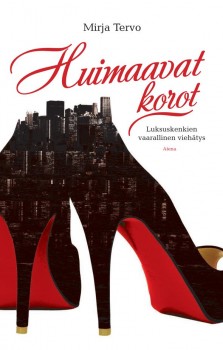 C’est moi. Tribute. Eliza. Muse. Monica. Very Privé, Super Private.
C’est moi. Tribute. Eliza. Muse. Monica. Very Privé, Super Private.
These are names of shoes that women buy in luxury shops on New York’s Fifth Avenue. Six inches or more of heels that cost anything between 500 and 5,000 dollars, make walking torture; but pain is tolerated, as along with the shoes a woman acquires a deeply satisfying feeling of being envied, beautiful and sexy (her toe cleavage has to be clearly visible).
Mirja Tervo (born 1971) is an ethnologist who spent a year and a half selling luxury shoes in Manhattan. Among her fellow sales personnel were a medical doctor, a musician, an actor and a retired baseball pro.
The shoe salon paid no salary, just commission of ten per cent, and the required minimum sale per week was 3,500 dollars. If a sales person failed to sell merchandise worth this sum, he or she was given a loan of 300 dollars, payable immediately when the results improved, and they quickly had to. More…
Nordic Drama Award for Heini Junkkaala
14 May 2010 | In the news
On May 7 playwright Heini Junkkaala (born 1975) received the bi-annual Nordic Drama Award (worth €5,000), presented by the Nordic Theatre Union.
Her play Kymmenen tikkua laudalla (‘Ten sticks on a board’, 2008) is a drama for children spanning three generations that contains both realistic and fantastic elements. Junkkaala’s latest play, Kristuksen morsian (‘Bride of Christ’), about religion and homosexuality, was premièred at the Finnish National Theatre in March.
The last two winners of the award were also Finns: Juha Jokela received it for his play Fundamentalisti (The Fundamentalist) in 2008, and Kari Hotakainen won the prize for his play Punahukka (Border Crossing) in 2006 (both have been translated into English; introductions in English are available here; click Translations of Finnish drama).
What Finland read in April
14 May 2010 | In the news
In April Sofi Oksanen’s best-selling novel Puhdistus, Purge (winner of the Finlandia Prize for Fiction in 2008, WSOY, and now available in English translation) was top of the best-selling Finnish fiction list again. Quite an achievement.
Finns seem to be besotted with Pertti Jarla’s comic books: three of them, set in the weird city of Fingerpori (‘Fingerborg’, Arktinen Banaani), were on the list.
The final volume of artist and writer Hannu Väisänen’s fictionalised autobiography, Kuperat ja koverat (‘Convex and concave’, Otava, 2009), was number five on the list. Number three was a newcomer, Tumman veden päällä (‘On dark water’, Tammi), also an autobiographical novel about childhood, by the the actor Peter Franzén.
Names appearing high on the foreign fiction list in April included Child Lee, Dan Brown, Falcones Ildefonso, Liza Marklund, Pamuk Orhan and W.G. Sebald.
Markku Koski: ‘Hohto on mennyt herrana olemisesta’ [‘The glory has gone from being a VIP’]
7 May 2010 | Mini reviews, Reviews
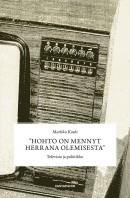 ‘Hohto on mennyt herrana olemisesta’ – Televisio ja poliitikko
‘Hohto on mennyt herrana olemisesta’ – Televisio ja poliitikko
[‘The glory has gone from being a VIP’ – the television and the politician]
Tampere: Vastapaino, 2010. 254 p.
ISBN 978-951-768-249-7
€ 29, paperback
This book, based on the author’s doctoral thesis in Media and Communication Studies at the University of Tampere, presented in February 2010, takes as its starting point Walter Benjamin’s well-known essay, ‘The Work of Art in the Age of Mechanical Reproduction’. Koski applies Benjamin’s ideas on cinema and film stars to contemporary television and politics. Koski maintains that while the public have become alienated from politics, politicians have also become alienated from themselves and have become reiterative entities whose essential content is repetition. After television and other new media have called into question traditional forms of politics, a significant challenge for politicians has been to prevent viewers from getting bored. Koski discusses relationship between politics and comedy, the ‘cynical’ viewer, the popular public image of Marshal Mannerheim (an iconic figure in Finnish history and politics) and the popularity of Sauli Niinistö, the frontrunner in the upcoming (2012) Finnish presidential election. Dr Koski also considers historical and contemporary image politicians in various other countries.
Literature international
7 May 2010 | In the news
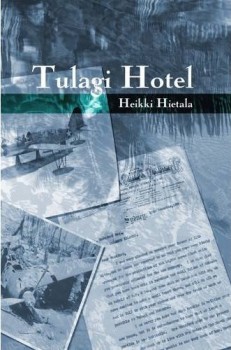 A novel set on the islands of the Pacific and Indian Oceans, Tulagi Hotel, was published by Dragon International Independent Arts (Diiarts) in London on 12 April. The writer is a native Finn, Heikki Hietala, who wrote his book in English.
A novel set on the islands of the Pacific and Indian Oceans, Tulagi Hotel, was published by Dragon International Independent Arts (Diiarts) in London on 12 April. The writer is a native Finn, Heikki Hietala, who wrote his book in English.
Hietala, a translator and lecturer at Haaga-Helia University of Applied Sciences in Helsinki, began writing his novel in 1996, and in 2008 a refined version was uploaded onto the HarperCollins website, Authonomy, where Tulagi Hotel rose to number 15 in the popularity ratings for novels – in a selection of some eight thousand. It is now available also in an electronic version for Kindle.
The story takes place in the years of the Second World War and after; a US Marine fighter pilot from the Midwest, Jack McGuire, settles down on the Solomon Islands and begins to run a hotel. The arrival of his wartime best friend’s widow, Kay Wheeler, disrupts his orderly civilian life.
We congratulate the author for his rare achievement – however, we’d like to point out a small error. Tulagi Hotel is advertised as ‘the first book written in English by a Finn to be published outside Finland’, this is not quite true, as Anselm Hollo, a native Finn, translator and poet living in Colorado, has been publishing poetry books in English in the UK and the US since the 1960s. (Here are samples of his poems:)
Prose prizes
7 May 2010 | In the news
This year’s Finnish Government Prizes for Literature and Translation have been awarded to, respectively, the writer and journalist (and former Editor-in-Chief of Books from Finland) Kristina Carlson (born 1949) and the translator Tarja Roinila (born 1964). The prizes, which are given on the recommendation of the Finnish National Council for Literature and are worth €15,000 each, were awarded at a ceremony in Helsinki on 4 May by the Minister of Culture and Sports, Stefan Wallin.
Carlson’s second novel, Herra Darwinin puutarhuri (‘Mr Darwin’s gardener’, Otava), published last autumn, is a taut, deep and rich story narrated by many voices, contrasting science and faith, solitude and community. ‘It is not often that a single work renews the novel form,’ remarked the jury. (We featured an interview with Carlson, as well as an extract from the novel here on the Books from Finland website last September.)
The translator Tarja Roinila has specialised in prose and poetry written in Spanish, French and German; her latest translations, of the linguistically complex novels of the Austrian author Thomas Bernhard, are extremely musical, the jury remarked.
On 4 May, which was celebrated in Finland as the Day of the Book and the Rose (this custom, which originally took place on St George’s Day, April 23, was born in Barcelona: originally men gave women roses, and received books in return), Kristina Carlson received the Kiitos kirjasta (‘Thanks for the book’) medal, awarded jointly by the Booksellers’ Association, the bookshop sales asistants’ association Libro and the Finnish Library Association.
Paris, je t’aime
7 May 2010 | This 'n' that
‘Paris traverse la pensée comme une encyclopédie de la vie, où l’on découvre des passages, des cours intérieures, des ruelles et des autoroutes, toujours plus surprenants. La ville ne se vide ni n’abandonne jamais, n’accorde ni ne refuse.’
‘Paris permeates your mind like an encyclopaedia of life in which you will incessantly discover astonishing new passages, courtyards, alleys and avenues. It will never either run empty or surrender, it won’t admit or refuse.’
L’air de Paris / Pariisin tuoksu (‘Air of Paris’, Musta Taide, 2009) is an elegant little book that features artwork by Ismo Kajander and texts by Anna Kortelainen relating to the mother city of all artists. More…
Coming up next week…
7 May 2010 | This 'n' that
‘…A strange tapir / (the bi-coloured one) / a wondrous tapir (the many-toed one) / circles the tree, goes round and about, / a small word hangs from the tip of his snout….’
Helvi Juvonen (1919–1959) wrote nature-inspired poetry; she was a fan of the 19th-century American poet Emily Dickinson, whose work she also translated. Her short adult life, in the drab Helsinki of the post-war years, was burdened by poverty and illness, and yet she wished to ‘toast the richness of our lives’.
The literary scholar Emily Jeremiah has translated a handful of Juvonen’s poems and takes a look at her work in this, the 15th part of a series devoted to classic Finnish authors (also available in our archive are essays about Kirsi Kunnas, Henry Parland and Sirkka Turkka). Helvi Juvonen: small words celebrate ‘the richness of our lives’


